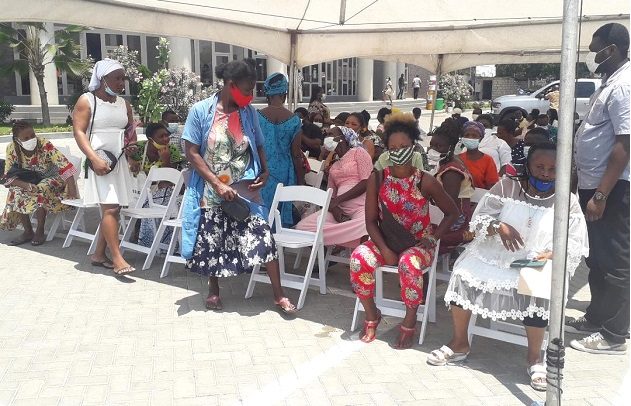Some female business owners at NBSSI’s Day Out programme
THE NATIONAL Board for Small Scale Industries (NBSSI) is set to ensure that women-owned businesses account for 70 per cent of beneficiaries of the GH¢750 million Coronavirus Alleviation Programme Business Support Scheme (CAP BuSS).
According to NBSSI, an agency under the Ministry of Trade and Industry, about 800,000 businesses had requested for various supports under the scheme with 240,000 businesses receiving disbursement as at the end of September, 2020.
Women-owned businesses accounted for 110,000 micro, small and medium enterprises (MSMEs).
Meanwhile, about 24,229 applicants have within the first week of October received their package while many others await verification and approval of applications for disbursement.
Speaking about the strategy at a recently launched Ghana Women Entrepreneurship Summit (GWES) 2020 launch, the Deputy Greater Accra Regional Minister, Elizabeth Sackey, said that such a strategy was the surest way for post Covid-19 economic recovery, noting that women dominated the MSME sector of the economy.
Deputy Minister of Trade & Industry, Robert Ahomka-Lindsay, for his part called on stakeholders to take pragmatic steps towards empowering women entrepreneurs in the country.
He noted that addressing the socioeconomic needs of women who form the majority of Ghana’s population required careful planning and targeting to ensure that policies formed by state actors go a long way to bridge the existing economic gaps on the basis of gender.
“It is the case in Ghana that women are slightly more than men in terms of population, but they are half the skills set, half the capability and half of the future,” Mr. Ahomka-Lindsay said.
Deputy Executive Director of NBSSI, Anna Armo-Himbson, also said the board was committed to ensuring that women entrepreneurs were well catered for in the design and implementation of packages for businesses.
In so doing, the NBSSI, she said, had undertaken interventions that sought to improve access of women to business development services, finance, domestic and international markets as well as regulatory support for operations.
Chairperson of the Investment Committee of Mastercard Foundation-NBSSI Covid-19 Resilience Programme, Mary Brown, said beyond the need for growing businesses owned by women there was the need to improve their resilience to enable women entrepreneurs to withstand uncertainties.
By Issah Mohammed

